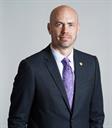
By Scott C. Nelson, DPM, FACFAS
ACFAS President
If you want to rule the world, keep it amused—which is probably why you hear a lot of jokes in and around the surgery department. For instance, “Why do surgeons make great joke tellers?” “Because they leave everyone in stitches.” Or another classic, “If a surgeon fails an eye surgery, no one bats an eye, but a surgeon fails a brain surgery, and everybody loses their minds.” We have all also heard the classic general surgery joke “all bleeding stops…eventually” one as well. Those are just a few of jokes you often hear around the operating room because they are fairly benign (no pun intended) and easy to remember. Some of my more memorable ones came from Larry Rubin, DPM, FACFAS, with his ‘surgeons prayer,’ which simply states what the surgeon says before his extremely difficult case on a person of poor health, “Dear God, please get us through this surgery with great results and if you do, I will never do this again.” One of my favorites is “my outcomes seem to be the best when patients are lost to follow up” because if we don’t know how they are doing then all is well, right?
Well unfortunately that last joke makes you stop and think a little. Part of the humor comes because we all know how important follow-up is to understanding the results and without them, it can lead to a false sense of security. Without follow-up and knowing your outcomes you live in some parallel universe, which is rich with euphoria and toxic positivity. Over the years it has been emphasized by several prominent members of the College how research needs to be done to propel and promote our profession, but where can this come from?
Wouldn't it be reasonable to start emphasizing to the training programs at the schools and residency programs the importance of research? In fact, it's probably more appropriate to make this a requirement in my opinion. Shouldn't it be required when molding the future of our profession that we would like them to think scientifically and have a full understanding of the importance of clinical outcome data?
The recent surge in fellowship programs are another excellent option for research. This should be a breeding ground given the fact that fellowship is an area dedicated to a specific type of pathology/procedure type. If we need information on Charcot reconstruction vs sports medicine vs total ankle replacement outcomes, we have those available and fellows dedicated to learning about these conditions. We have excellent training programs dedicated to teaching the intricacies of these conditions. This seems to be an excellent resource, and part of the program could include data collection for publication. I believe, this should be part of the program and being a part of a research project should be required to be recognized by the College.
The problem to implement these requirements is multi-fold. First, we need to have a method to collect data and second we need to be vigilant in data acquisition. Doing so with certain financial considerations is part of our fiduciary duty but this member benefit is important. This is just the starting point, but it has the possibility to have tremendous power for all of us. We need to strive to think scientifically and verify what we all already know—we have great outcomes and our surgical recommendations are based on evidence. That should be standard and exactly what you would expect from someone doing surgery on your loved ones.
If outcomes aren’t being researched and published, then our profession is doomed to whither. At this point the College has ramped up its outcomes/registry investigations and we are looking to find the best fit for our organization. We will continue to pursue this potential and hope the entire profession gets behind it as we try to make it a reality next year. Maybe 2021 will have better sight than 2020?
